#national book awards
Text
LeVar Burton Is Still Fighting For Your Right to Read

In an age of unprecedented book bans, the actor and literacy advocate is going to the mat for the freedom to read. "America loves to live in the shadows," he says, "but we're living in an age when the truth wants to come out."
by Adrienne Westenfeld
Nearly two decades after PBS’s long-running series went off the air, the Reading Rainbow generation is all grown up. Their love of reading and knowledge is an enduring gift, courtesy of host LeVar Burton and the show’s producers—but in an age of unprecedented assaults on the freedom to read, what’s to become of today’s young readers in the making?
As ever, Burton is looking out for them. The actor and literacy advocate recently served as the honorary chair of Banned Books Week, an annual October event dedicated to raising awareness about attempts to remove reading materials from libraries, schools, and bookstores. Now, he’s making his second appearance as the host of the National Book Awards, where “censorship” will no doubt be the word on every honoree’s lips. “I've put in work in this field; I've put in time on these issues,” Burton told Esquire. “I'm happy to be the face of it and represent it, because these are matters that I care deeply about.”
READ MORE
Great interview, worth the read.
"The whole idea of Americans being in control of their own bodies, their own minds, and their own destinies is a political issue, which is weird, given the fundamental underpinnings of the creation of this nation. But here we are, having this conversation about bodily autonomy, what kids should read, and what we should think. For me, it's a fight worth fighting. It's not only a conversation worth having. It's a fight worth fighting... The fight for reproductive freedom is tied to the effort to ban books. They're definitely linked. What we're looking at is authoritarian control, and that's just not part of the charter."
4K notes
·
View notes
Text
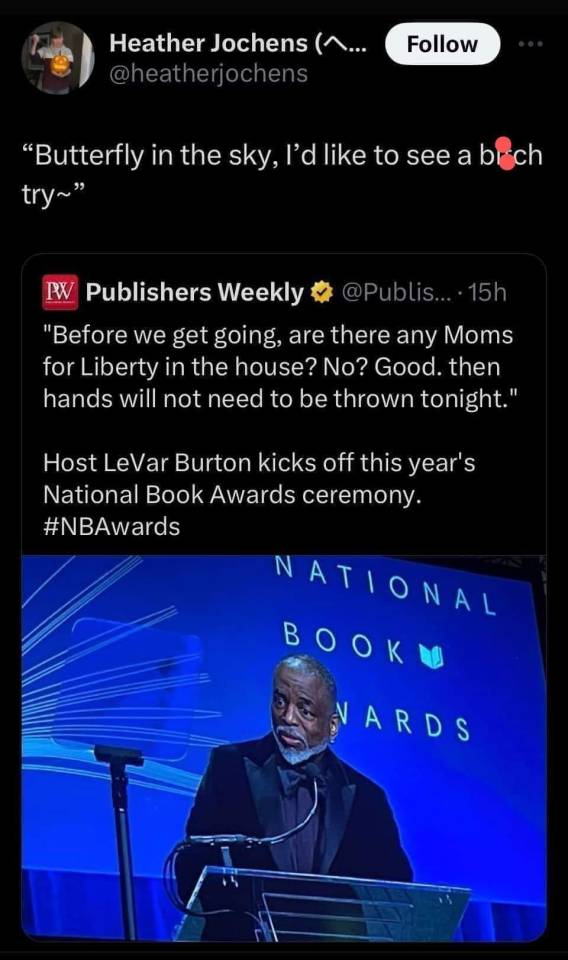
96 notes
·
View notes
Text
The Finalists of the 41st National Book Awards
The National Book Development Board (NBDB) and the Manila Critics Circle (MCC) announce the finalists of the 41st National Book Awards, an annual prize honoring the most outstanding book titles written, designed, and published in the Philippines.
For this cycle of the National Book Awards, a total of 235 titles were submitted across 34 categories consisting of 7 languages: Filipino, English, Bikol, Binisaya, Hiligaynon, Tausug, and Waray. Following the awarding of winners during the 40th cycle in May 2023, the 41st iteration of the awards is slated to take place in February 2024.
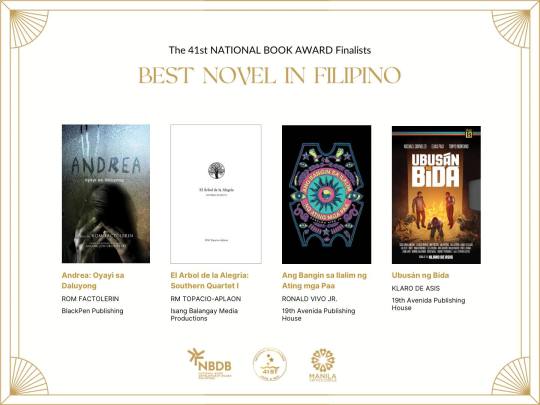

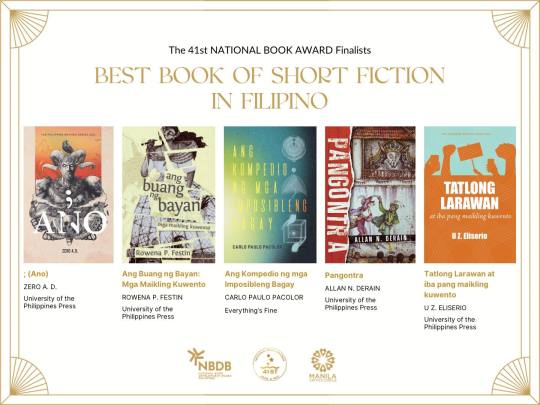



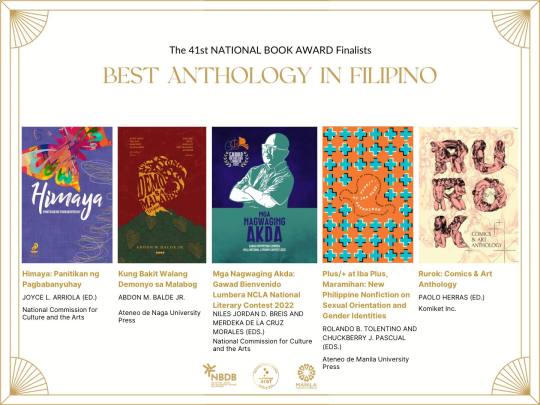

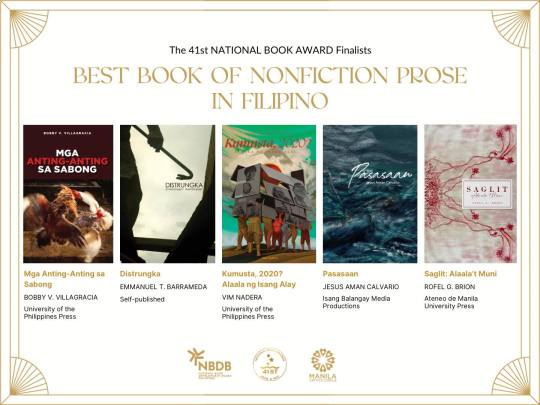

See the full list here.
56 notes
·
View notes
Text
National Book Foundation, I don't have twitter to tell you thank you for rescinding your invitation to Drew Barrymore as a host for your ceremony. She is scabbing, and must be held accountable. Thank you for standing with the unions.
Heartbroken, as Drew is one of the few people in Hollywood who had my respect and I didn't have anything bad to say about her.
#national book foundation#national book awards#drew barrymore#wga strong#wga strike#support the wga#wga solidarity#i stand with the wga#writers strike#sag strike#sag aftra#sag afra strike#sag strong#sag aftra strong#aftra strike#scab#union strong#union solidarity#labor unions
34 notes
·
View notes
Text

The sixth annual National Book Awards were presented at the Hotel Commodore on January 25, 1955. Three of the winners were (L to R) Joseph Wood Krutch, for The Measure of Man; William Faulkner, for A Fable; and Wallace Stevens, for The Collected Poems of Wallace Stevens.
Photo: John Rooney for the AP
#vintage New York#1950s#John Rooney#National Book Awards#Joseph Wood Krutch#William Faulkner#Wallace Stevens#awards#Jan. 25#25 Jan.#literature
16 notes
·
View notes
Text
I wonder who would make sense to do the book thing....

Oh i know, the man who encouraged millions of children to FUCKING READ.
14 notes
·
View notes
Text

Kaia Gerber | National Book Awards (2023)
7 notes
·
View notes
Text
7 notes
·
View notes
Text
9 notes
·
View notes
Text
#NationalBookAward#winner for Translated Literature via New Vessel Press! THE WORDS THAT REMAIN by STÊNIO GARDEL & translated by Bruna Dantas Lobato. My 5* #BookRecommendation is here:
#book blog#book review#book tumblr#booksgiving#queer books#lgbt books#new vessel press#national book awards#brazilian translation#bruna dantas lobato
4 notes
·
View notes
Photo


The National Book Foundation has just announced the longlist for the 2023 National Book Award for Translated Literature. The ten titles were written in seven languages. A total of 154 books were submitted.
(via The National Book Awards 2023 longlist for translated literature is announced!)
#books#reading#book awards#national book awards#literature#translated literature#reader updated#news
6 notes
·
View notes
Text
Among the finalists and featured in photo are: "Tarantadong Kalbo 2," "Flowers for Thursday," and "Tingle."
8 notes
·
View notes
Text
2 notes
·
View notes
Text
The National Book Award finalists have been announced.

2023 Longlist for the National Book Award for Fiction:
Nana Kwame Adjei-Brenyah, Chain-Gang All-Stars Pantheon Books / Penguin Random House
Aaliyah Bilal, Temple Folk Simon & Schuster
Eliot Duncan, Ponyboy W. W. Norton & Company
Paul Harding, This Other Eden W. W. Norton & Company
Tania James, Loot Knopf / Penguin Random House
Jayne Anne Phillips, Night Watch Knopf / Penguin Random House
Mona Susan Power, A Council of Dolls Mariner Books / HarperCollins Publishers
Hanna Pylväinen, The End of Drum-Time Henry Holt and Company / Macmillan Publishers
Justin Torres, Blackouts Farrar, Straus and Giroux / Macmillan Publishers
LaToya Watkins, Holler, Child Tiny Reparations Books / Penguin Random House
2023 Longlist for the National Book Award for Nonfiction:
Ned Blackhawk, The Rediscovery of America: Native Peoples and the Unmaking of U.S. History Yale University Press
Jonathan Eig, King: A Life Farrar, Straus and Giroux / Macmillan Publishers
Viet Thanh Nguyen, A Man of Two Faces: A Memoir, A History, A Memorial Grove Press / Grove Atlantic
Prudence Peiffer, The Slip: The New York City Street That Changed American Art Forever Harper / HarperCollins Publishers
Donovan X. Ramsey, When Crack Was King: A People’s History of a Misunderstood Era One World / Penguin Random House
Cristina Rivera Garza, Liliana’s Invincible Summer: A Sister’s Search for Justice Hogarth / Penguin Random House
Christina Sharpe, Ordinary Notes Farrar, Straus and Giroux / Macmillan Publishers
Raja Shehadeh, We Could Have Been Friends, My Father and I: A Palestinian Memoir Other Press
John Vaillant, Fire Weather: A True Story from a Hotter World Knopf / Penguin Random House
Kidada E. Williams, I Saw Death Coming: A History of Terror and Survival in the War Against Reconstruction Bloomsbury Publishing
2023 Longlist for the National Book Award for Poetry:
John Lee Clark, How to Communicate W. W. Norton & Company
Oliver de la Paz, The Diaspora Sonnets Liveright / W. W. Norton & Company
Annelyse Gelman, Vexations University of Chicago Press
José Olivarez, Promises of Gold Henry Holt and Company / Macmillan Publishers
Craig Santos Perez, from unincorporated territory [åmot] Omnidawn Publishing
Paisley Rekdal, West: A Translation Copper Canyon Press
Brandon Som, Tripas Georgia Review Books / University of Georgia Press
Charif Shanahan, Trace Evidence Tin House Books
Evie Shockley, suddenly we Wesleyan University Press Monica Youn, From From Graywolf Press
2023 Longlist for the National Book Award for Translated Literature:
Juan Cárdenas, The Devil of the Provinces Translated from the Spanish by Lizzie Davis Coffee House Press
Bora Chung, Cursed Bunny Translated from the Korean by Anton Hur Algonquin Books / Hachette Book Group
David Diop, Beyond the Door of No Return Translated from the French by Sam Taylor Farrar, Straus and Giroux / Macmillan Publishers
Jenny Erpenbeck, Kairos Translated from the German by Michael Hofmann New Directions Publishing
Stênio Gardel, The Words That Remain Translated from the Portuguese by Bruna Dantas Lobato New Vessel Press
Khaled Khalifa, No One Prayed Over Their Graves Translated from the Arabic by Leri Price Farrar, Straus and Giroux / Macmillan Publishers
Fernanda Melchor, This Is Not Miami Translated from the Spanish by Sophie Hughes New Directions Publishing
Pilar Quintana, Abyss Translated from the Spanish by Lisa Dillman World Editions
Astrid Roemer, On a Woman’s Madness Translated from the Dutch by Lucy Scott Two Lines Press
Mohamed Mbougar Sarr, The Most Secret Memory of Men Translated from the French by Lara Vergnaud Other Press
2023 Longlist for the National Book Award for Young People’s Literature:
Erin Bow, Simon Sort of Says Disney-Hyperion Books / Disney Publishing Worldwide
Kenneth M. Cadow, Gather Candlewick Press
Alyson Derrick, Forget Me Not Simon & Schuster Books for Young Readers / Simon & Schuster
Huda Fahmy, Huda F Cares? Dial Books for Young Readers / Penguin Random House
Vashti Harrison, Big Little, Brown Books for Young Readers / Hachette Book Group
Katherine Marsh, The Lost Year: A Survival Story of the Ukrainian Famine Roaring Brook Press / Macmillan Publishers
Dan Nott, Hidden Systems: Water, Electricity, the Internet, and the Secrets Behind the Systems We Use Every Day Random House Graphic / Penguin Random House
Dan Santat, A First Time for Everything First Second / Macmillan Publishers
Betty C. Tang, Parachute Kids Graphix / Scholastic, Inc.
Yohuru Williams and Michael G. Long, More Than a Dream: The Radical March on Washington for Jobs and Freedom Farrar, Straus and Giroux Books for Young Readers / Macmillan Publishers
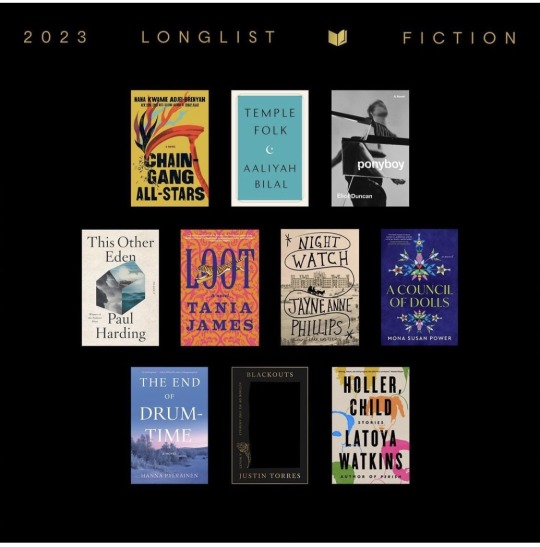
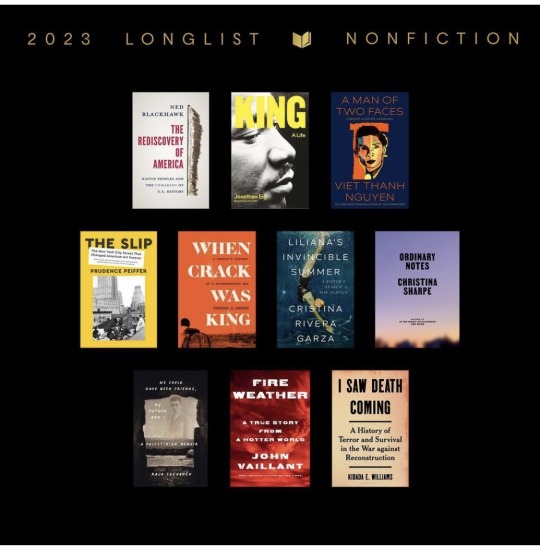
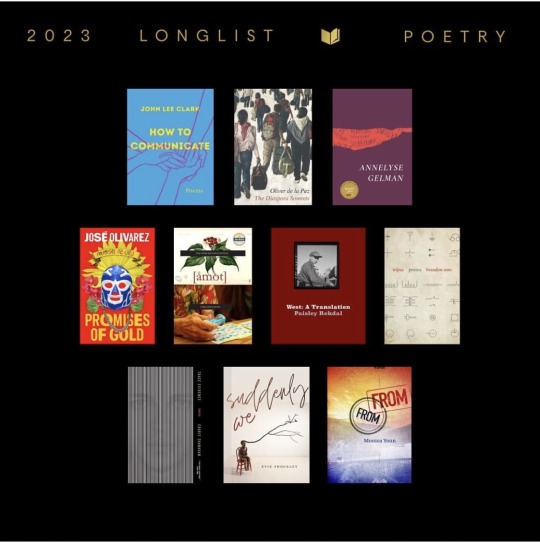
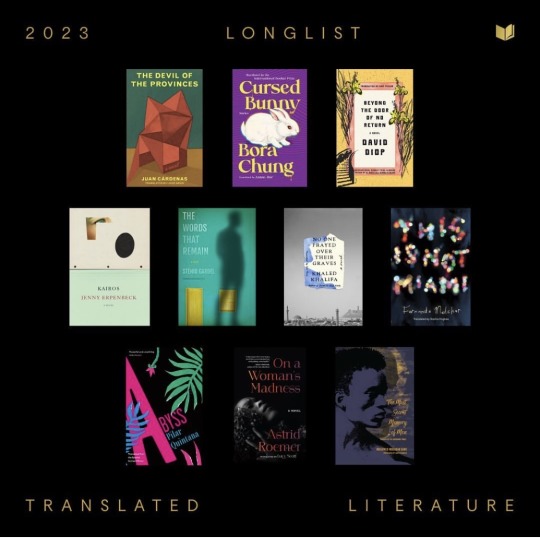

3 notes
·
View notes
Text
“What is it about King’s writing that appeals to so many people? Clearly, King’s readers — many of whom seem to get hooked on him when they are adolescents — don’t care that the sentences he writes or the scenes he constructs are dull. There must be something in the narrative arc, or in the nature of King’s characters, that these readers can’t resist. My sense is that King appeals to the aggrieved adolescent, or the aggrieved nerdy adolescent, or the aggrieved nerdy adult, who believes that people can be divided into bad and good (the latter would, of course, include the aggrieved adolescent or adult), a reader who would rather not consider the proposition that we are all, each of us, nice good people awash in problems and entirely capable of evil. King coddles his readers, all nice, good, ordinary, likeable people (just like the heroes of his books), though this doesn’t completely explain why these readers are so tolerant of the bloat in these novels, why they will let King go on for a couple hundred pages about some matter that has no vital connection to the subject of the book.
(…)
Why, I wondered again, do some people in the literary business regard this extremely successful writer of genre fiction as a first-rate writer of literary fiction, a “major” contributor to American literary culture? How is it possible that a novel as bloated and mediocre as 11/22/63 is can be deemed by the New York Times Book Review as one of the five best books of fiction of the year? Do we fear being labeled “elitist” or “liberal” if we don’t reward commercial success in other ways (as if an enormous advance and a river of royalties are not reward enough)? Or do we believe that commercial success on the King scale signifies, almost by definition, quality, the way a 20,000 square-foot house supposedly signifies to passersby that the owners must be important?
(…)
By bestowing rewards on writing that is not all that good, has not the literary establishment lowered standards and pushed even further to the margins writing that is actually good and beautiful? If you ask me whether it is worth your while to read Stephen King instead of (or even in addition to) scores of other better contemporary writers you may have never read (and should hurry up and read before you die), I would say no, unless you are maybe fifteen and have made it clear to your teachers and everybody else that you aren’t going to touch that literary “David Copperfield kind of crap” with a ten-foot pole.”
“Director Daphné Baiwir gathers these guys — more than 20, it’s a convocation — and clips from their handiwork to build a monument to King’s importance. Few of these testimonies address King’s literary quality, only his cultural impact (from Cujo and Stand by Me to Needful Things, which spawned the non-King streaming series Stranger Things). Baiwir correctly begins with irony: King’s literary reputation comes from movie adaptations. “It all started with Carrie,” says Mick Garris (the TV adept who directed small-screen versions of Bag of Bones, Desperation, Sleepwalkers, The Stand, and The Shining). “The book was not well known until [Brian] De Palma’s movie came out. The movie blew me away. It was so great.” Frank Darabont concurs: “It was the movie that really brought a lot of attention to Steve’s work.”
(…)
King’s popularity straddles both film and literature and has done so for a long time. (Scott Hicks raves, “He’s like the Charles Dickens of the 20th and 21st century.”) This could be the basis for a good argument in favor of democratic art — folklore made by Maine’s most famous author — although Baiwir’s opening sequence foolishly imitates a film set in “King world,” where backwoods eccentrics drink “American Grain” whiskey, referring, I guess, to William Carlos Williams’s In the American Grain. It’s a stretch, and Baiwir’s strained pretense eventually snaps. No one at the convocation remembers Edgar Allan Poe, Nathaniel Hawthorne, Herman Melville, William Faulkner, or Flannery O’Connor. Instead, the most worshipful filmmakers indulge King’s own real-world politics — especially when paying tribute to The Dead Zone and Children of the Corn.
Encomiums start with “he loved common people, folksy people, he’s got that down pat.” They go on: “He doesn’t condescend to middle America, and I think that’s very important. In many ways he’s a man of the people.” But they fall for King’s junkiness: Ignoring how the warring duo of Misery resembles a feminist-revenge version of Robert Aldrich’s mature, complex What Ever Happened to Baby Jane? It gets worse when The Dead Zone appeals to their current political paranoia: “Nations go insane.” They equate King’s anti-religious fantasies (It, The Stand) to George Romero’s racial zombie allegory in Night of the Living Dead. The fanboys make typical Hollywood-liberal partisan analogies, decrying Donald Trump’s populism, then hysterically anoint King as a political visionary: “Like Bob Dylan, [he] is a dreamer of America. He contains the entirety of it and sort of dreams in the language of the chaos of America.” Garris warns, “When you apply fear — paranoia, aggression happens. The veneer of civilization gets ripped away very quickly.” He praises The Stand as “a counter myth to the Rapture.” Tod Williams crowns King “prophet of the apocalypse.”
It’s silly, yet appalling, that schlockmeister King, always threatening to be taken seriously, should be seriously regarded by unserious, unthinking people. King on Screen platforms naïve fanboys who embellish their own childish superstitions.”
4 notes
·
View notes
Link
Established in 1950, the National Book Awards are American literary prizes administered by the National Book Foundation, a nonprofit organization. The Awards currently honor the best Fiction, Nonfiction, Poetry, Translated Literature, and Young People’s Literature, published each year.
Meet the four African American Authors who have been nominated for the 2022 National Book Awards in the categories of nonfiction, fiction, and poetry.
3 notes
·
View notes